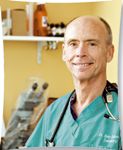Specialty medicine doesn't have to lead to a fight over cases
In the new millennium, everyone can win by joining forces to fight for patients' best interests.
When I finished veterinary school in 1968, a new graduate could buy a box of vaccine and a bottle of penicillin and open a veterinary practice. Start-up costs were minimal, and while diagnostic capabilities were crude, you could make a living vaccinating and neutering animals.
Clearly, times have changed. Veterinary diagnostic capabilities, treatments, and nutrition are vastly improved, so pets are living longer. And technology is advancing at a logarithmic rate. That's why we have specialists; they have the equipment and training to handle more advanced procedures.
It's crazy to think you'll master imaging by buying an ultrasound machine and a book. And we need to stop believing the myth that we can provide today's level of veterinary medicine as isolated entrepreneurs.
That's tough, because we want to believe we can. And distributors and manufacturers have a vested interest in reinforcing this old paradigm. They make more money selling cheap ultrasound machines to many hospitals than by selling one really good machine to a practice with a well-trained individual who knows what's on the screen.
Where does this leave us? The capacity for improved care is good news for pets and owners. Still, it'd be a challenge for general practitioners if clients gravitated toward specialty practices to resolve their pets' health problems.
In my opinion, the general practitioner (GP) will always be essential. It's the GP who understands all of the pet's health issues. The GP must be the quarterback for the patient, calling the shots even when someone else helps carry out the play.
Unfortunately, GPs tend to lose control when the patient's referred to a specialty practice. I believe more hospital mergers are part of the solution—and the next step in the evolution of companion-animal medicine. The public now demands 24-hour care. And economically, it doesn't make sense for five 24-hour hospitals to exist in the same community.
Why not develop one central hospital with 24-hour care staffed by trained individuals with state-of-the-art equipment that the GP can use? Why not have a central facility owned by local GPs? Qualified, peer-reviewed veterinarians—owners or not—could enjoy hospital privileges and admit their patients for hospital care.
If the case is baffling, the GP can call in a specialist. If surgery is required, the GP may elect to do the procedure or have a specialist do it. In this scenario, keeping GPs involved in their patients' care is in the practice's best interest. And observing the specialists in action and helping direct their patients' care helps everyone. At the same time, GPs certainly won't forsake their existing facilities. They'll still perform in-house diagnostics and minor outpatient surgeries. They'll still offer internal medicine, well-animal care, and the like.
It's just that GPs will send complicated, serious cases to the central hospital for 24-hour care, and they'll stay in charge. The bottom line is that all parties win—the patients, the specialists, and the GPs.

Dr. Ben H. Colmery III specializes in dentistry at The Dixboro Veterinary Dental and Medical Center in Ann Arbor, Mich., and speaks internationally on the subject of veterinary dentistry.